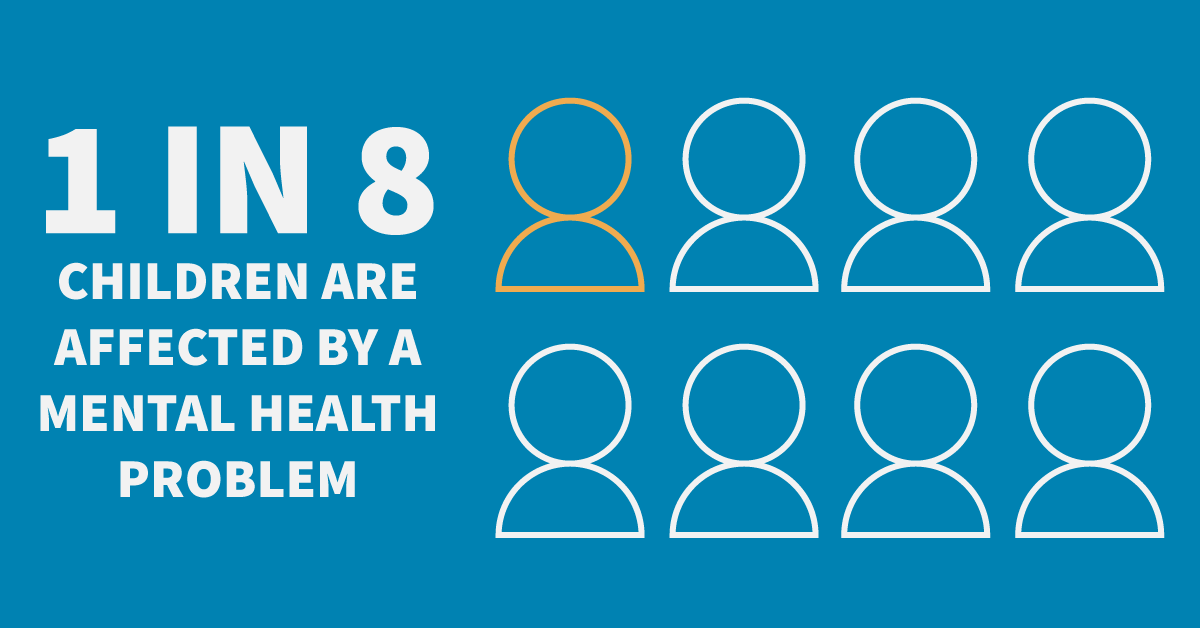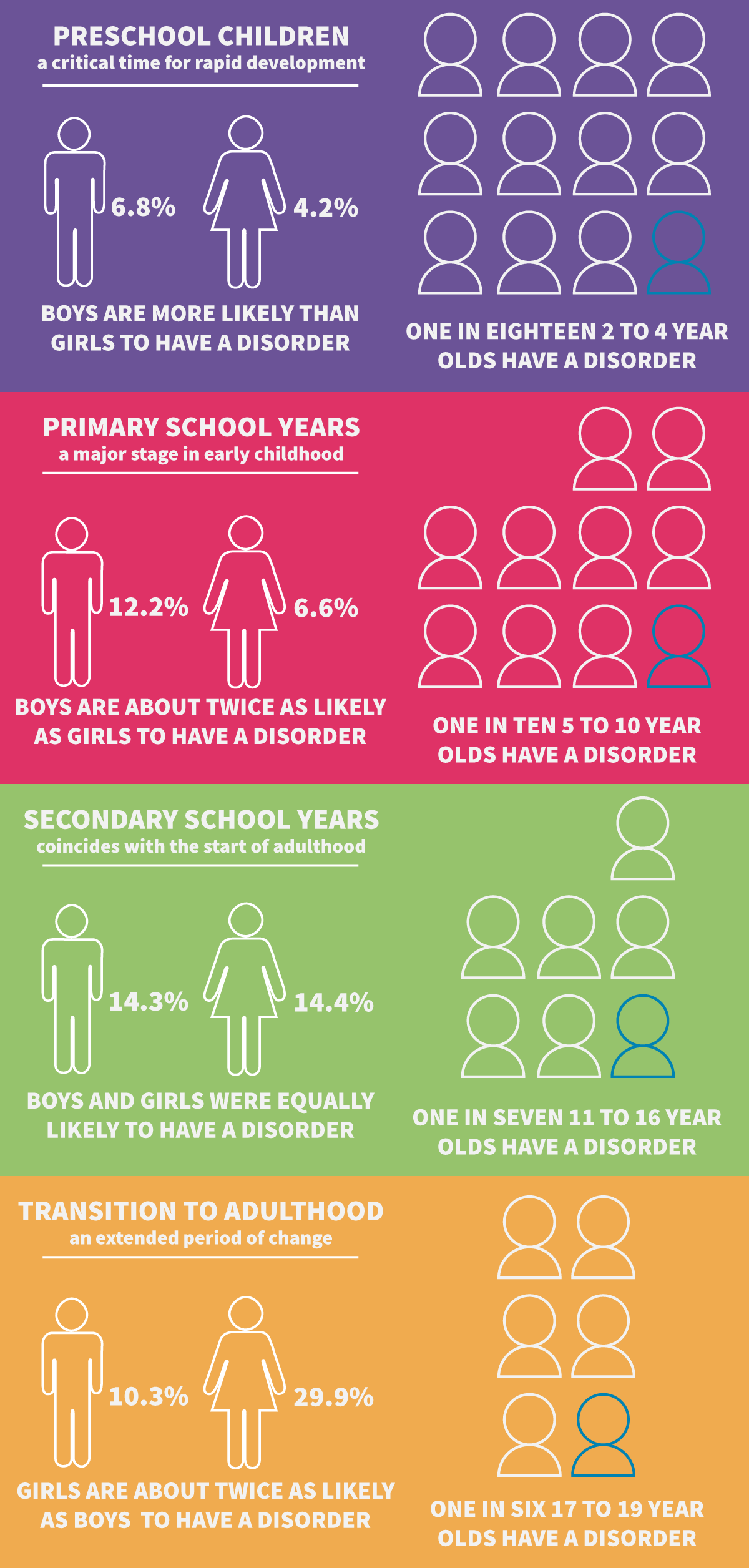In 2017, it was found that 12.8% of 5-19-year-olds had at least one mental disorder.

Growing up, it’s extremely important that the emotional wellbeing of children is treated equal to their physical health. The early stages of life are critical and impact many things in later years. Ensuring children have good mental health will allow them to develop the resilience to cope with what may come their way in the future and grow into healthy adults.
There’s a wide range of mental health issues that people can suffer from, and we all cope with them in different ways. Here are some of the main mental health problems that affect children and young people:
- Depression – this has become increasingly common in children and young people over the last few decades. Teenagers are more likely to experience this than young children.
- Generalised anxiety disorder – this causes people to become extremely worried, this may affect people that are going through sudden change such as moving school or home.
- Post-traumatic stress disorder (PTSD) – this follows a traumatic event that has happened in a children or young person’s life, such as abuse and bereavement.
- Self-harm – this is a common problem among young people, many find that it helps them manage or relieve themselves from intense emotional pain. Self-harm doesn’t necessarily mean that a child or young person is suicidal.
- Attention Deficit Hyperactivity Disorder (ADHD) – this is often found in children who are constantly overactive and may have concentration issues. The cause of ADHD isn’t yet fully understood.
- Eating Disorder – These are usually developed in teenage years and can include anorexia nervosa, bulimia nervosa, body dysmorphic disorder etc. When developed early these can cause serious physical health issues.
50% of mental health problems are established by age 14 and 75% by age 24. It is important that we work hard to ensure children and young people’s mental health problems are being established early so that professionals can intervene and offer support. Growing up is a daunting time for everyone and lot’s of change is experienced. Identifying these problems earlier can make growing up a smoother transition for young people.

It’s also important that it’s a healthy and positive lifestyle is encouraged, things that contribute positively to children and young people’s mental health includes:
- Being in good physical health, having a balanced diet and getting regular exercise
- Having the time and freedom to play both indoors and outdoors
- Taking part in local activities and clubs
- Spending positive time with family
- Regularly attending a school that promotes healthy lifestyles and wellbeing
Children will experience things in different ways, and it’s likely that some children may be exposed to risk factors that other children won’t be. There are certain risk factors that can contribute to mental health problems
- Having a long-term physical illness
- Having a parent who has mental health problems
- Experiencing death of a loved one or someone close to them
- Having divorced/separated parents
- Having been bullied
- Having been sexually / physically / emotionally abused
- Living in poverty / homelessness
- Experience discrimination
- Acting as a carer for a relative and taking on adult responsibilities at an early age
- Having educational difficulties
Whilst all of these factors can negatively impact a children and young people’s emotional wellbeing, it doesn’t mean it’s inevitable that these children and young people will suffer with any kind of mental health problem. However, it’s important to be able to recognise these risk factors and seek help and support for children and young people.
If you work with children and would like to better your understanding of children and young people’s mental health, learn more about our Level 2 Children & Young People’s Mental Health distance learning qualification here
Local Help
Your GP
They will be able to provide help and advice. Your GP can also provide access to appropriate specialist services and local organisations.
Call 111
You can call 111 when you need medical help fast but it’s not a 999 emergency. NHS 111 is available 24 hours a day, 365 days a year. Calls are free from landlines and mobile phones.
NHS mental health services
Find local mental health services on the NHS website – http://www.nhs.uk
Local organisations
They provide a range of services including support groups, help lines and information. Details can be obtained from your GP, your local library, or the internet. If you need help or information about child mental health
National Help
Childline
Free 24-hour counselling service for children and young people up to their 19th birthday.
0800 1111
https://www.childline.org.uk
Mind
Infoline Offers advice and support to service users; has a network of local associations in England and Wales to which people can turn for help.
0300 123 3393, text number: 86463
http://www.mind.org.uk
SANE
Provides practical help, emotional support and specialist information for people aged 16 and over with mental health problems, their family, friends and carers.
0300 304 7000
www.sane.org.uk
Supportline
Confidential telephone helpline offering emotional support to any individual on any issue.
01708 765200
www.supportline.org.uk
Beat
Provides helplines, self-help groups and online support to anyone affected by eating disorders.
Helpline: 0808 801 0677, Youthline: 0808 801 0711, Studentline: 0808 801 0811
www.b-eat.co.uk
The Samaritans
The Samaritans provide a confidential service for people in despair and who feel suicidal.
116 123
www.samaritans.org.uk
NSPCC
Provides helplines and information on child abuse, child protection and safeguarding children.
0808 800 5000
https://www.nspcc.org.uk/
Young Minds
Young Minds has a Parent Helpline that offers free confidential telephone and email support to any adult worried about the wellbeing of a child or young person.
0808 802 5544
http://www.youngminds.org.uk/for_parents
Statistics from – https://files.digital.nhs.uk/A6/EA7D58/MHCYP%202017%20Summary.pdf

